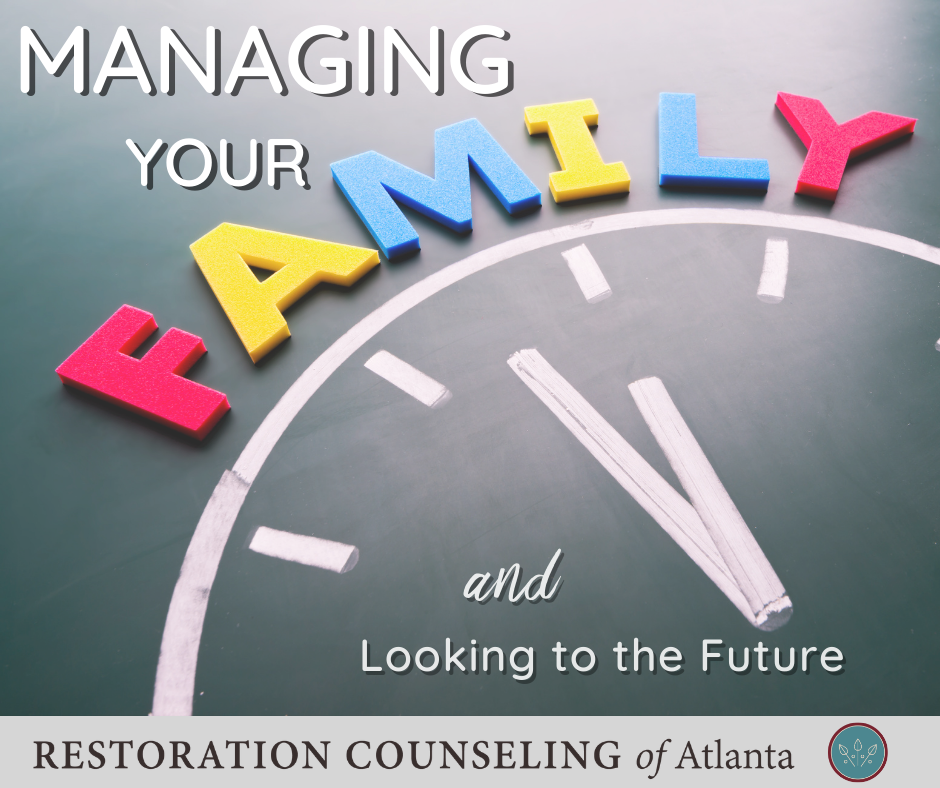Looking to the Future
It’s a new year, and I spent the end of 2020 thinking forward to ten years from now and how I want my life to be then. As I walked through a defined exercise, I came upon the family category and thought about what I might want for my family. I’m at the phase in my life where ten years from now, both my kids will be college graduates and entering the beginning years of their careers, maybe even engaged or headed toward marriage for themselves. It’s kind of crazy. It was a stretch to envision them then and get boldly specific in my wants for my family. However, starting this thinking process made me think more deeply about what I want to happen in my family life right now. Why wait for tomorrow when sowing seeds in the here and now is within reach?
I’m a firm believer that the investments we make in our family life now pay big dividends in the future. Of course, some people are naturally better at this than others, and for them, it’s easy to cultivate key values in their family. Other folks struggle. Wherever you find yourself on this continuum, a few key tactics can bring about significant improvements and help you get moving in your desired direction. With a little observation, mindfulness, and intentionality directed towards our family, we could help make 2021 a better year for our families.
Practicing Observation
When we practice observation, we want to look at the key relationships in our family circle. The first person we have a relationship with is ourselves. Ask yourself what you’ve been doing and how you’ve been doing. You could even ask a family member to give you feedback with the questions provided here. To practice the art of observation, we have to be present first. You know, putting away our phones, engaging in conversations, combating distractions in the room, or our minds. When we are present, we significantly increase the chances of hearing what someone is trying to tell us.
Questions About Myself
You can ask yourself these questions or ask them of some of the key relationships in your life.
- How am I doing at responding to what you need?
- Am I taking care of myself?
- How am I doing at handling myself in a calm, peaceful manner?
- Where do you think I can grow in 2021?
- Where do I want to grow in 2021?
- Can you see me bearing any of the fruits of the spirit, and if so, which ones? Which one’s are lacking?
After we’ve learned how we are doing, noticing ourselves, we can start seeing what we can observe and learn about our relationships/marriages and kids. You have the choice to ask these suggested questions of people in your family, or ask yourself if you know the answers and discover where your attention may have been slipping.
Questions About My Marriage or Relationship
If your goal is to have a better relationship/marriage in 2021, here are a few questions to consider:
- What might my partner wish to be different in our relationship?
- Do I understand the things that are most important to my partner?
- What do we need to leave behind in our relationship?
- What ideas are worth starting in our relationship?
Questions About My Kids
You can work on answering these questions alone or with your spouse.
- What do my kids repeatedly have trouble with as I parent them?
- Where do my kids lack organization or responsibility (given their age)?
- What are the natural talents present in my kids, and how could I encourage their development?
- How can I encourage and support my child’s spiritual growth?
Practicing Mindfulness in our Family
The word mindfulness is a bit of a buzz word in the counseling field right now. Counselors have learned that distressed people often get caught up living in past traumas or fixations of their minds. If we help them come into the present moment, things usually calm down. This idea can apply to our families as we focus more on the specific definition of mindfulness: the quality or state of being conscious or aware of something. When we are aware and paying attention to the things happening in our families, we can change things.
Some key examples of being mindful in your family might include:
- Working to be present during meal times, see what you notice.
- Noticing how your day flows with different family members. When do you talk, and what do you talk about?
- Becoming aware of what your kids ask from you or when they come around just wanting to hang out.
Intentionality Directed Toward Family
If the old sayings about goals are correct – you can’t get where you don’t aim to go, then imagine what would happen if we spent some intentional time directed toward our family.
I’m currently helping cultivate my sons’ development in specific areas related to their gifts or life skills that match their current ages. It helps when you already know how to do something, like teach your kids about how to manage money, but you can also learn something together. I’ve seen dads buy old cars and rebuild them with their sons or pick up a hobby to do and learn with their child. The critical ingredient isn’t expertise; it’s intentionality. When you to be present and WITH your family in key ways, everyone benefits.
Seeing Our Families in 2021
If we focus on some of these things, our families’ chances to be present, know more about what’s happening in them, and devote intentional time to our families are endless. Many people felt 2020 took us for a lousy ride. 2021 gives us a great time to shift our energies and work to be more intentional about what happens in our families. You have things to give and ways to enrich those in your life. Know that who you are with them makes a massive difference to all of you. Together you can gracefully grow into a more loving enriched unit regardless of your circumstances.

Written by: Jennifer Stuckert, Clinical Director, LPC
Roswell Location
jennifer@restorationcounselingatl.com, ext. 111
Jennifer uses distinctly Christian counseling to help struggling individuals, couples, and families. Since 2009, she has served as the director and supervisor of the staff of Restoration Counseling of Atlanta. She has two decades of counseling experience and helping people gain relief from life challenges. Jennifer uses biblically sound methods with a specific emphasis on adaption according to personality and learning styles. She is certified in EMDR and completed extensive course work in Sexual Addiction Counseling.

